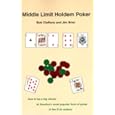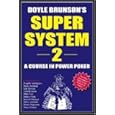 As I mentioned previously, Normandie now has as $15-30 game, and I’m very happy to see that. In order to improve my game, I started reading Bob Ciaffone and Jim Brier’s book, Middle Limit Poker. I like some sections of the book and I feel it is helping me to improve my game, but some of Bob Ciaffone’s ideas regarding hand selection just don’t seem to stand up to close scrutiny.
As I mentioned previously, Normandie now has as $15-30 game, and I’m very happy to see that. In order to improve my game, I started reading Bob Ciaffone and Jim Brier’s book, Middle Limit Poker. I like some sections of the book and I feel it is helping me to improve my game, but some of Bob Ciaffone’s ideas regarding hand selection just don’t seem to stand up to close scrutiny.
 He doesn’t believe in playing KJ suited if the pot is raised at all, even if there are multiple callers, which is different advice than Jennifer Harmon gives in Super System 2. Of course it comes down to play style, but I think I have to go with Jennifer Harmon on that one. KJ suited seems like an excellent volume hand and why not put it into a volume pot. Of course, one of the early limpers may reraise and you’re suddenly forced to play in a capped pot, but that doesn’t happen to often. In most games, if players are limping early, they have a calling hand. If you are playing against a table of tricky or deceptive opponents, then laying down suited cards in the face of one raise seems like sound policy, but to say that you should play all games that way just seems way too nitty to me.
He doesn’t believe in playing KJ suited if the pot is raised at all, even if there are multiple callers, which is different advice than Jennifer Harmon gives in Super System 2. Of course it comes down to play style, but I think I have to go with Jennifer Harmon on that one. KJ suited seems like an excellent volume hand and why not put it into a volume pot. Of course, one of the early limpers may reraise and you’re suddenly forced to play in a capped pot, but that doesn’t happen to often. In most games, if players are limping early, they have a calling hand. If you are playing against a table of tricky or deceptive opponents, then laying down suited cards in the face of one raise seems like sound policy, but to say that you should play all games that way just seems way too nitty to me.
In regards to hand selection on the button when there have been four or so limpers in front of you, Bob Ciaffone seems to fall into the line of thinking made popular by David Skalansky that undervalues suited hands in comparison to small pairs. Specifically he recommends calling with any pair on the button in that situation, and suited hands such as 10-9 or K9, but nothing lower than that. According to him, “We do not recommend limping in with King little suited or worse. The problem with limping in with any just any suited King, Queen, or Jack is that, against a lot of opponents, drawing to the nut flush becomes increasingly important. Contrary to what many players believe, when many players take a flop, it is common for one flush to lose to another flush.”
Well, sure, but its also common for one set to lose to another set when many players take a flop, but he doesn’t seem to acknowledge that. Let’s take a look at the basic mathematics of Holdem starting hands. Since you get two cards out of 52, the number of possible combinations of starting hands are 52 multiplied by 51 divided by 2 or 1326 possible two card combinations. Now, if you already have a two-card hand, and are interested in the likelihood of other hands people might be holding, then the number of possible combinations are 50×49/2 or 1225. So, if we hold pocket deuces, let’s examine the likelihood of other people holding over pairs: there are six different combinations of each possible pair, and there are twelve ranks that are higher than yours, so that’s 12 x 6, or 72 different combinations of pairs that are higher than deuces. Divide that by 1225 or 5.8% likelihood than another players two card hard contains a pair higher than yours. Given that there are eight other players at the table (or nine in a Las Vegas setting) there that’s eight times 5.8%, or 46.4% likelihood that at least one of the other players present has a pair higher than yours when you have deuces.
Mike Caro has been advocating for a while that people steer away from the lower pairs of deuces through fives and I feel that’s sound advice- flopping a set when someone flops a higher set is very expensive. Now Bob Ciaffone does have a point that making a flush when someone has a higher flush is also very expensive, but he shouldn’t turn around and then advocate playing all your pairs in a multiway un-raised pot on the button. If one holds a hand such as King little suited, what is the likelihood that someone else holds a suited Ace of the same suit- the only hand that you really fear when you make a flush.
If you have a King and a deuce of a given suit, the is only one Ace of that suit and ten other cards of that suit (because you have two yourself). So that would be 11 combinations of a suited Ace higher than yours, and there are, again, 1225 possible combinations. 11/1225 is .00897, or .9% or so per player. Since there are eight other players present, the total likelihood of another player holding a higher suited Ace is 7%. Furthermore, unlike a pair of deuces, this hand has other ways to win rather than just hitting the flop hard. You could flop top pair, which is a dubious holding because of your weak kicker, but keep in mind that you are also in last position. If everyone checks to you, and then do not check raise you when you bet, then you are almost assured of having an uncontested top pair for that particular hand.